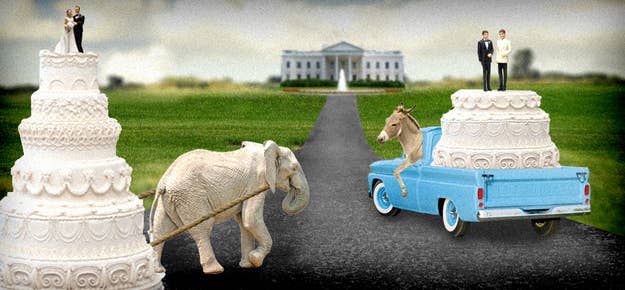
The two parties emerged from their conventions last week with the trend in the marriage wars increasingly clear: Democratic support for the right of same-sex couples to marry has become increasingly vocal and universal, while Republican opposition — stated in the party platform — appears to be splintering among the rank and file.
The Republican Party's formal position, and the formal statements of its candidates for president and vice president, are direct: They support a proposed Federal Marriage Amendment to stop states from allowing same-sex couples to marry and oppose President Obama's decision to stop defending the Defense of Marriage Act. But the convention scarcely reflected that position. Not a single person on the stage of the Republican National Convention specifically mentioned the proposed amendment, although five people — including Mitt Romney — referred more generally to protecting “the institution of marriage” or the “traditional meaning of marriage.” Few Republicans at all were talking about support for the proposed constitutional amendment in Tampa. And one prominent Republican, former Judiciary Chairman Sen. Orrin Hatch, even broke with his own past vote in support of the amendment, telling Michelangelo Signorile, “I'm a believer that the states should make their own determination.”
Another Republican with a unique standpoint on the shift is Kathryn Lehman, who is out and appeared with her partner at events in Tampa — but was not in 1996, when she served as counsel to the Judiciary Committee’s subcommittee on the Constitution and helped draft the Defense of Marriage Act. Now, she is working with the group Freedom to Marry to overturn DOMA, and her story, and her experience, are in some ways emblematic of the Republican Party’s difficult position in 2012.
“I think it’s just a matter of time. It’s just really hard to justify on a fairness basis," she said.
Lehman, a prominent Republican lobbyist with Holland & Knight, said the platform committee is out of touch with the party's rank and file.
“It’s not just random conservative people. It’s super-conservative, super-social conservative types. So, they pretty much get to write the platform," she said of hte committee, which was chaired by Virginia Gov. Bob McDonnell, consisted of social conservative stalwarts like Phyllis Schlafly of the Eagle Forum, Tony Perkins of the Family Research Council, minister David Barton and lawyer James Bopp.
Noting that about 20 of the roughly 100 platform committee members even supported two amendments that would have ended the party’s support for DOMA and the proposed Federal Marriage Amendment, Lehman said, “There are a lot of things that have been ‘traditional’ in this country. Women couldn’t vote until 100 years ago. Thank God, in this country, we said, ‘That doesn’t make a lot of sense, that doesn’t really live up to our promise of equality and freedom.’
“I am cautiously optimistic when you look at the demographic trends. Four years is a long time … with this issue," she said of the changes that could come by the Republicans' next convention. "More people are coming out. You know more gay people. I’m a lobbyist. I know lots of Republican members of Congress. Julie [Lehman’s partner] and I, they know Julie because she’s at fundraisers.”
She's not the only one with those thoughts. Former Arizona Rep. Jim Kolbe predicted to BuzzFeed that the next platform would not contain similar language around a constitutional amendment.
The Democrats' position is now much simpler.
“We support marriage equality” — the line in the 2012 Democratic Party platform — is a long way from September 1996, when then-President Bill Clinton — in the midst of his own re-election effort — stated when signing DOMA into law, “I have long opposed governmental recognition of same-gender marriages and this legislation is consistent with that position.”
Now, the formal party position is that the 1996 law should be repealed and that same-sex couples legally married in one jurisdiction should continue to have their marriage recognized by the federal government even if they move to a state that doesn’t recognize their marriage. The party also explicitly supports passage of the Employment Non-Discrimination Act, which would outlaw workplace discrimination against lesbian, gay, bisexual and transgender people based on sexual orientation or gender identity.
But, it was marriage and DOMA where the Democrats’ changed position was most clear — and most clearly enunciated. From the opening speakers to Obama’s speech, the party’s support for marriage equality was an essential element in the extended sales pitch that is the convention experience.
When Obama took to the stage at the Democratic National Convention just 24 hours after former President Clinton had done so, the changed reality on the matter of marriage was clear when Obama listed the “other voices” that would influence debate if Obama’s supporters stop working for political change.
Included alongside ”lobbyists and special interests” were “Washington politicians who want to decide who you can marry.”
